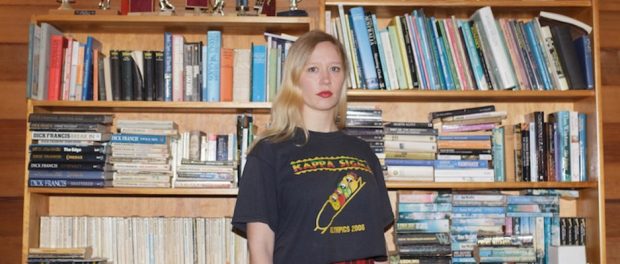Julia Jacklin, Manchester Soup Kitchen

Scour the lyric sheet of Julia Jacklin‘s debut album blind and you’d fancy a life lived longer, certainly, if not richer. But the Australian, in her mid-twenties now, knows more about the writer’s art than many twice her age. Explore the expressive confessionals and sharply crafted observation of Don’t Let the Kids Win and, though Jacklin’s life is finely traced within, finding her in there is not always so easy. This is not show and tell: the listener should place a piece of themselves between the lines. That’s when the songs open up, that’s when they bloom.
Her last Manchester show brought its own particular challenges, as a large crowd chattered while waiting for headliners Whitney, only to ultimately fold as Jacklin and her three piece backing band patiently worked though her album. You suspect a good portion of those converts are here tonight, with Soup Kitchen sold-out well in advance – though, so often the case with local crowds, the price for a roaring end-of-set response is polite applause in the lead-up.
That set still asks much of the headliners. Only bassist Harrison Fuller survives from the previous visit, and his energy and drive is crucial in a setting where guitars and drums largely provide colour and detail rather than dynamics. And it’s notable that, with an audience initially all out of whoops and cheers, Jacklin matches them for modesty. An opening ‘Hay Plain’ unfolds in its own good time: you tense and release as the rhythm section finally moves in. Jacklin has a voice that can rattle your spine but more often than not she toys with its lower range. She knows that volume is an easy trick and that she connects deeper if she takes it down, forces us to listen hard. A short solo section mid-set is startling proof of this: ‘LA Dream’ is barely there but it freezes the room.
As we thaw – “Thank you – no one ever sings along to that one,” Jacklin laughs after a shattering ‘Motherland’ – so does she, sharing stories from the road and thanking Fuller for driving for eight hours from Brighton through Storm Doris, despite his insistence on Billy Joel throughout. A new song is just what the halfway mark needs: Jacklin beginning in a whisper and closing at volume amidst a tumultuous climax. A set-closing brace of ‘Coming of Age’ – shiver, still, at that second verse key change – and ‘Pool Party’ is full-blooded and enveloping, and Manchester allows itself a moment of head-bobbing, foot-tapping abandon.
Ultimately, aside the skilled delivery, this is a remarkable showcase for the songwriter’s craft. These songs, written by Jacklin in her early twenties and given life by an event an inch away from chance (Jacklin sent them to producer Ben Edwards almost on a whim, only for him to immediately offer her a fortnight in his studio) are indebted to tradition but only at surface level. And they carry such charge, and such transformative power, you almost forget that their sprawling narratives are doused in a rich and unyielding sadness.
A delicate take on The Strokes’ ‘Someday’ aligns itself perfectly with Jacklin‘s minor key aesthetic as she sings “Alone we stand, together we fall apart.” And then there is ‘Sweet Step’, seemingly slight but comprised of much ‘You just fucking wait and see…’ bravado: “Dancing for yourself ain’t bad when you’re dying to find / That sweet step that will help you free your mind.” In tandem with that lyrical fortitude, for once, an artist’s website opts for self-deprecation rather than chest beating: “ Julia Jacklin is a singer/songwriter who’ll put a smile on ya dial, but only for a short while.” Never a truer word.
Go to your happy place? Where’s the sense in that?
